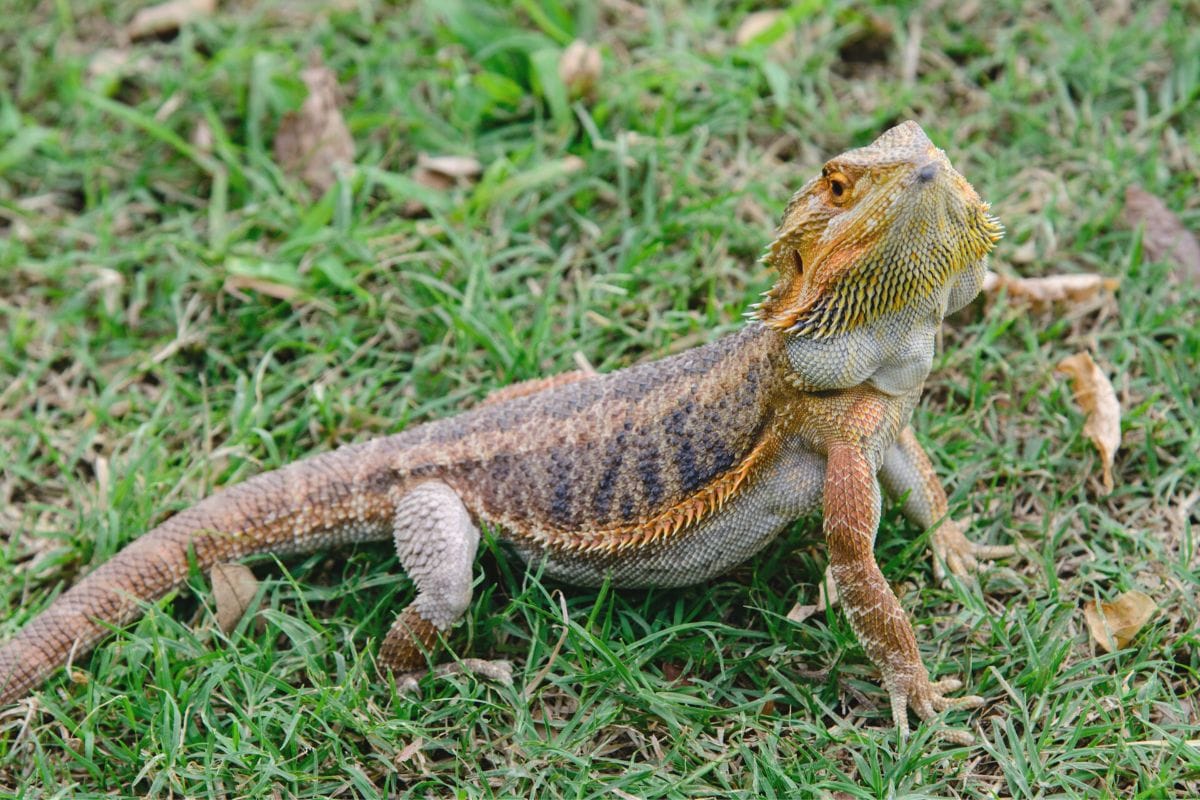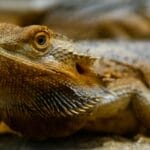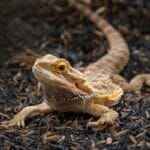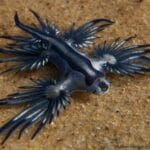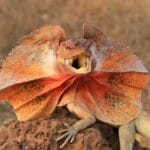Bearded dragons, those captivating creatures from the Australian outback, possess a unique survival strategy: brumation. While often mistaken for hibernation, brumation is a distinctly reptilian process. Imagine it as a period of profound relaxation rather than a deep slumber. In this comprehensive guide, we’ll delve into the fascinating world of bearded dragon brumation, exploring its nuances, dispelling common myths, and equipping you with the knowledge to provide optimal care for your scaly companion during this critical phase.
Brumation vs. Hibernation: What’s the Difference?
While hibernation might bring to mind a state of total dormancy, brumation offers a more flexible approach. Unlike true hibernators, brumating bearded dragons may occasionally rouse from their restful state to sip water or even indulge in a light snack. It’s less about complete shutdown and more about strategic energy conservation when resources dwindle.
But why the confusion? The answer lies in the shared characteristics of inactivity and extended sleep that often lead to the erroneous conflation of these two distinct processes. However, a closer examination reveals that brumation is triggered primarily by shifts in daylight hours and environmental temperature, not solely by plummeting temperatures, as is the case with hibernation.
Why Brumate? A Journey Back to Their Roots
To truly understand brumation, we must journey to the heart of the Australian wilderness, the bearded dragon’s natural habitat. Here, they experience dramatic seasonal fluctuations, much like our own changing seasons. As days shorten and temperatures dip, food and water sources become scarce. Brumation emerges as an ingenious evolutionary adaptation, enabling these remarkable creatures to conserve energy during lean times, ensuring their survival until conditions improve.
Recognizing the Signs: Is Your Bearded Dragon Brumating?
Identifying a brumating bearded dragon can sometimes be as simple as observing their extended retreat into their hide for days, steadfastly refusing even the most tempting treats. However, other times the signs are more subtle. Here’s what to watch for:
- Shifts in Activity Levels: Observe for decreased movement, a preference for lounging, and reduced basking behavior.
- Seeking Seclusion: Don’t be alarmed if your dragon spends more time hidden away in their hide or burrows beneath their substrate.
- Appetite Fluctuations: Be prepared for a decrease in their appetite, even to the point of refusing their favorite snacks.
- Subtle Color Changes: Some bearded dragons may exhibit slight color variations during brumation, often appearing a bit paler.
If you suspect your bearded dragon might be entering brumation, it’s essential to consult a reptile veterinarian. They can help differentiate these signs from potential health issues and ensure your dragon is healthy enough to brumate.
Guiding Your Dragon Through Brumation: A Caregiver’s Handbook
If your bearded dragon is preparing to brumate, you can take proactive steps to support them throughout the process:
- Embrace Gradual Transitions: Avoid sudden environmental changes. Over several weeks, gradually reduce the temperature within their enclosure and shorten their daylight hours, mimicking the natural transition into winter.
- Craft a Cozy Brumation Den: Provide a secure, tranquil, and dimly lit haven where your dragon can unwind and feel safe. Offering soft substrate for burrowing will enhance their comfort and mimic their natural habitat.
- Prioritize Hydration: Even with their reduced food intake, fresh water should always be available. While they may not drink as frequently, hydration remains crucial for their well-being.
- Monitor Weight Fluctuations: Regularly weigh your dragon throughout brumation to track any significant weight loss, which can be a cause for concern.
- Schedule Veterinary Checkups: A pre-brumation checkup with a reptile veterinarian is highly recommended to confirm your dragon is healthy and prepared for this metabolic shift.
Brumation Red Flags: When to Seek Immediate Veterinary Care
While brumation is typically a natural and healthy process, certain situations warrant immediate veterinary attention:
- Abrupt Onset of Symptoms: If your dragon suddenly starts exhibiting brumation-like symptoms without any gradual environmental changes, contact your vet immediately.
- Excessive Weight Loss: Although some weight loss is expected, a significant or rapid decline can indicate an underlying health issue.
- Concerning Symptoms: Any signs of illness, such as discharge from the nose or mouth, labored breathing, or open-mouth breathing, require immediate veterinary intervention.
Debunking Brumation Myths: Separating Fact from Fiction
- Myth: All Bearded Dragons Brumate Uniformly: Reality: Brumation is not a one-size-fits-all experience. Some dragons may brumate noticeably, while others exhibit subtle changes. Each dragon is an individual!
- Myth: Never Disturb a Brumating Dragon: Reality: While excessive disruption is discouraged, gently waking your dragon occasionally to assess their health and offer water is acceptable. Avoid force-feeding if they show disinterest.
- Myth: Brumation Negates Vet Visits: Reality: Regular veterinary checkups remain essential throughout a bearded dragon’s life, including before and potentially during brumation.
Exploring the Ethical Dimensions of Brumation in Captivity
As responsible caretakers, it’s crucial to consider the ethical implications of intentionally inducing brumation in captive bearded dragons. Should we allow their natural instincts to guide them in a controlled environment, or is it more ethical to maintain optimal conditions year-round? This complex question sparks ongoing debate within the reptile community, with experts advocating for both sides. Some argue that providing a consistent, resource-rich environment best serves their well-being, while others believe that allowing them to follow their innate rhythms, even in captivity, is crucial for their long-term health and potential breeding success.
Brumation and Breeding: A Deeper Dive
Brumation plays a significant, albeit complex, role in the bearded dragon’s reproductive cycle. While not fully understood, research suggests that brumation helps regulate hormonal activity, potentially influencing breeding readiness. Breeders often manipulate environmental cues like temperature and daylight to induce or suppress brumation, aiming to synchronize breeding cycles. However, this practice requires a deep understanding of the risks and benefits, and careful monitoring is essential to avoid stressing the animals.
The Future of Brumation Research: Unveiling the Unknown
Despite the growing body of knowledge surrounding brumation, several areas remain shrouded in mystery. Researchers continue to investigate the long-term health implications of regular brumation cycles in captive bearded dragons compared to those who experience shorter or less intense periods. Additionally, the precise hormonal and metabolic changes that occur during brumation, and how they differ between sexes and individuals, are still under investigation. Understanding these nuances could lead to more refined care practices and contribute to the long-term well-being of captive bearded dragons.
Empowering Owners Through Shared Experiences
The collective wisdom of the bearded dragon community provides invaluable insights. Anecdotal evidence from experienced owners offers a glimpse into the diverse ways dragons experience brumation, the challenges encountered, and the advice received from reptile veterinarians. Sharing these stories can help prepare new owners for the nuances of brumation and encourage them to seek expert guidance when needed. Online forums, social media groups, and reptile expos offer platforms for this valuable exchange of knowledge and experiences.
Concluding Thoughts: Embracing the Brumation Journey
By understanding and respecting the intricate rhythms of brumation, we can empower ourselves to provide the best possible care for our bearded companions. While this comprehensive guide serves as a starting point, remember that every dragon is unique. Consulting with a trusted reptile veterinarian for personalized advice tailored to your dragon’s individual needs and health history is always the most responsible course of action. Together, we can ensure our bearded dragons thrive throughout their brumation journey and beyond.
